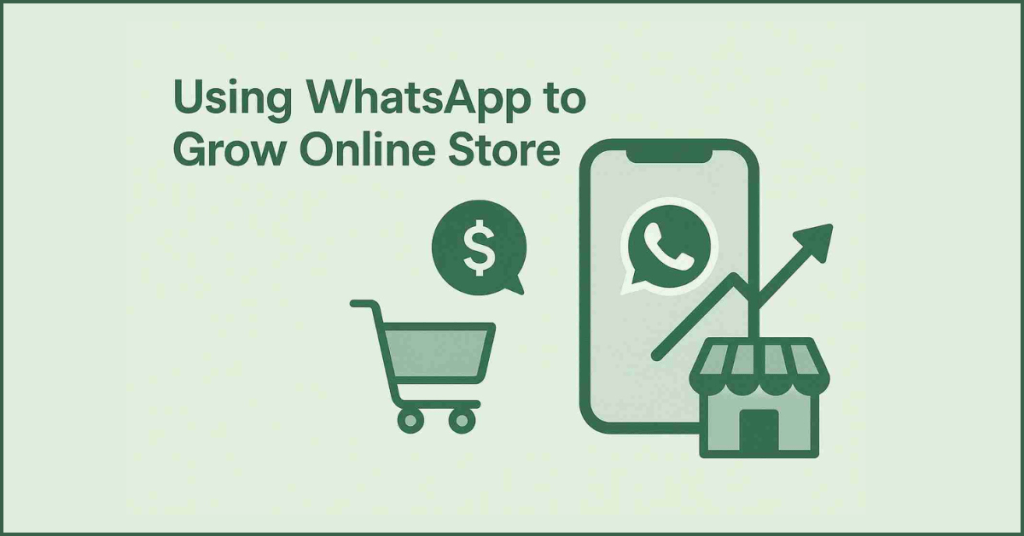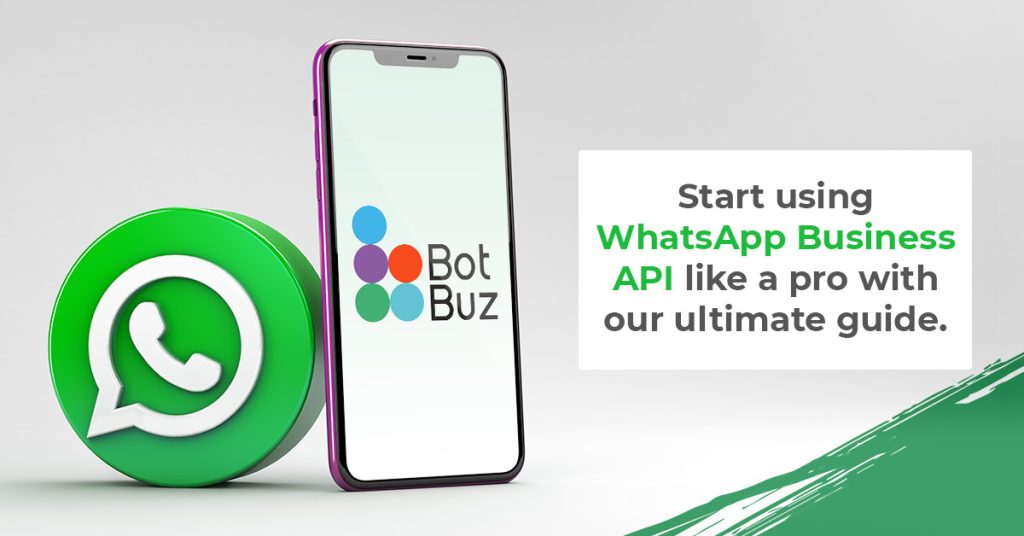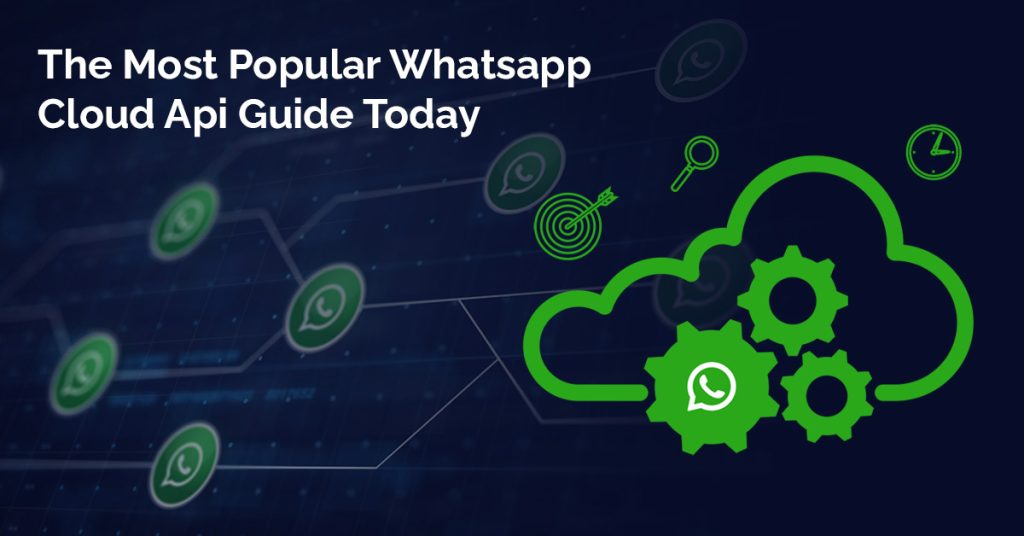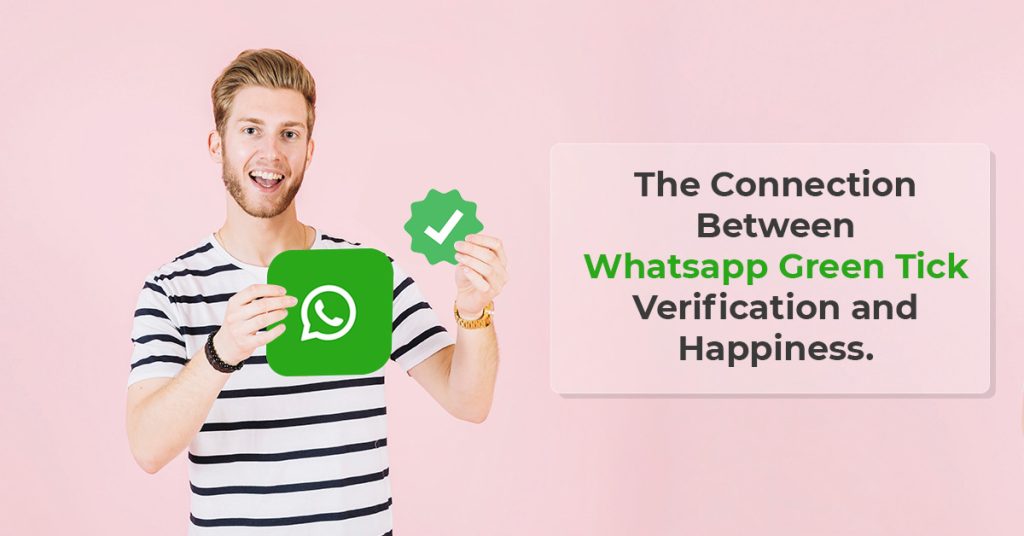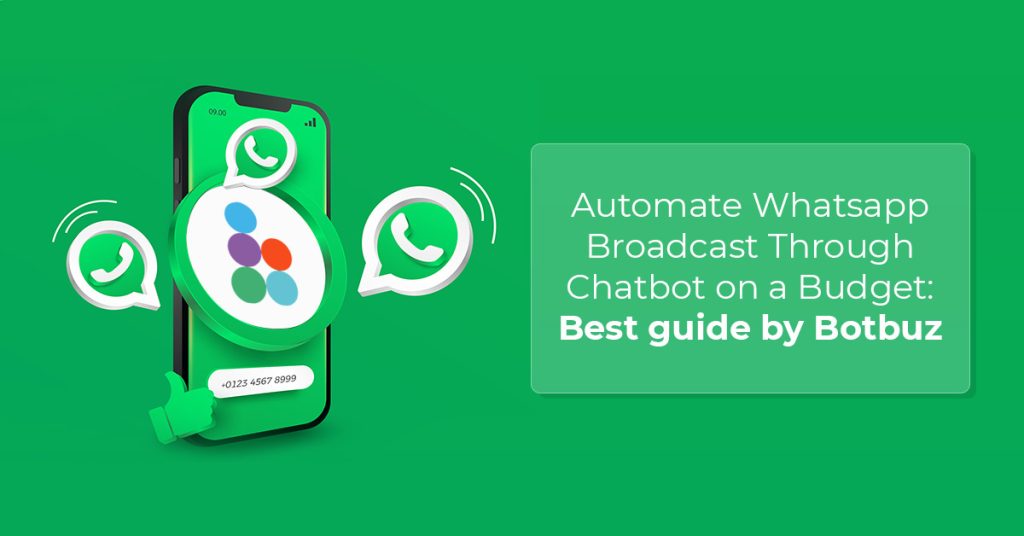- WhatsApp for Online Store :
- Why Use WhatsApp for Your Online Store ?
- Setting Up WhatsApp Business for Your Store :
- How to Use WhatsApp for an Online Store ?
- Using WhatsApp to Drive Sales and Engagement :
- Building Customer Loyalty Through WhatsApp :
- Turn WhatsApp Into Your Online Store’s Support Powerhouse through Botbuz :
- FAQs :
WhatsApp for Online Store :
The digital shopping world is being transformed by conversational commerce. It uses AI-driven messaging and chat to create personalized, real-time interactions. This trend is booming because it satisfies the modern consumer’s demand for immediacy. It provides personalization, and a seamless experience on their mobile devices.
WhatsApp is now a crucial business tool, leveraging its over two billion global users. It has become the top platform for connecting with customers due to its exceptionally high engagement rates (over 95% open rate). Also it has the ability to provide a direct, personal, and secure line of communication.
For online stores, WhatsApp is essential for competitive advantage in 2025. It streamlines the entire sales funnel. Right from using targeted “Click-to-WhatsApp” ads for acquisition to enabling purchases. It provides immediate post-sale support directly within the chat.
The final element is WhatsApp marketing and automation. Businesses use this to scale personalized engagement, which translates into increased revenue. Automated features like personalized abandoned cart recovery messages, instant order notifications, and AI-powered chatbots for support drive sales. Also it increases efficiency, and significantly boosts customer engagement.
Why Use WhatsApp for Your Online Store ?
WhatsApp has become indispensable for online stores. It is due to its vast user base and nearly 100% message open rates. It ensures maximum visibility for business communications.
The platform helps in building customer trust through real-time communication. Businesses can offer immediate support and gain credibility with a verified Business Profile. It helps in fostering stronger relationships.
WhatsApp simplifies the shopping process. It enables seamless product discovery and purchase directly within the chat. Customers can browse catalogs and complete transactions conversationally, leading to higher conversion rates.
Finally, WhatsApp acts as an all-in-one hub. It consolidates marketing (promotions), sales (catalogs and transactions), and 24/7 support (chatbots). Thus, boosting efficiency and overall customer experience.
Setting Up WhatsApp Business for Your Store :
Businesses must choose. It is between the WhatsApp Business App – free, single-user, basic for small operations. The WhatsApp Business API – paid, scalable, multi-user for large stores needing CRM integration & advanced automation.
A professional presence requires setting up a complete business profile. This involves using a clear brand logo & selecting the correct business category. It provides all essential contact information like the website and email address.
The profile must be made functional. It is done by creating a detailed product catalog and enabling automation. Key functions include setting up a Greeting Message, an Away Message & Quick Replies. It helps to streamline customer service and ensure immediate responses.
The verified business account (green checkmark) is vital. It confirms the store’s legitimacy and builds customer trust. This official verification is often necessary for accessing advanced features. Thus, scaling operations professionally.
How to Use WhatsApp for an Online Store ?
Step – 1 : The initial requirement for an online store is selecting the right WhatsApp solution. The WhatsApp Business App is a basic, free tool for small businesses. While the WhatsApp Business API (Platform) is the choice for larger enterprises. It needs scaling, multi-user access, and CRM integration. Dedicated services, such as Botbuz WhatsApp API, are used to unlock this advanced automation and scalability.
Step – 2 : A crucial step is integrating WhatsApp with the e-commerce platform. Whether it is Shopify, WooCommerce, or Magento. This connection ensures the store’s product catalog is instantly synced & shareable in chat. The integration also helps streamline the checkout and payment process. It often provides direct purchase links within the WhatsApp conversation.
Step – 3 : Stores must deploy WhatsApp Chatbots to automate customer service. These intelligent systems significantly improve response time and engagement. It is done instantly answering FAQs, offering tailored product recommendations & providing real-time order tracking. Botbuz Chatbot ensures these automated conversations are personalized & available around the clock.
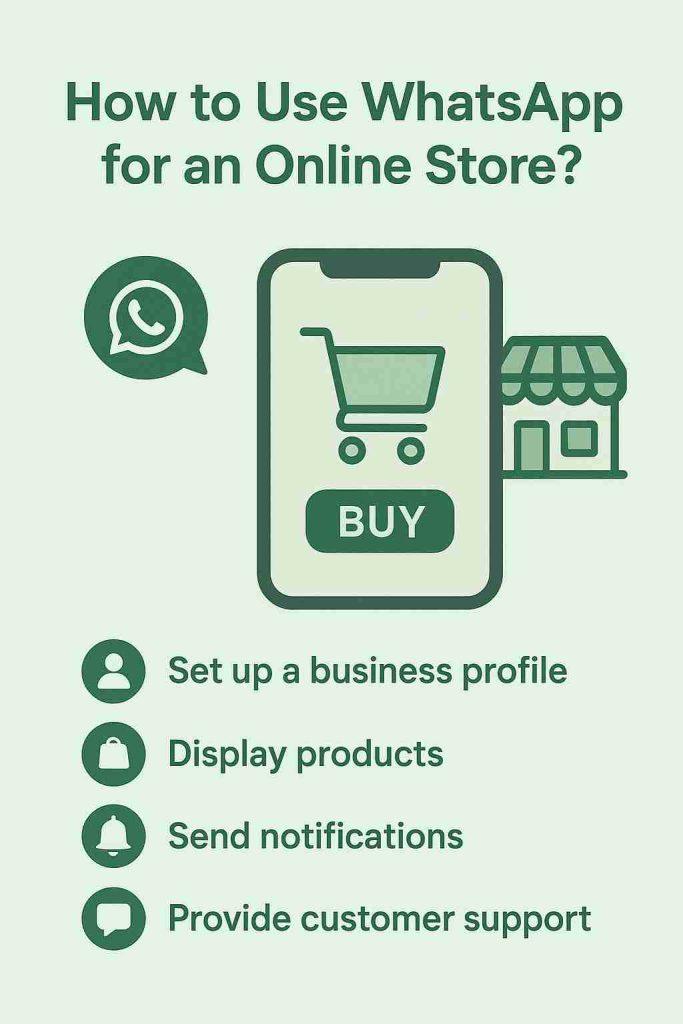
Step – 4 : For proactive marketing, the business uses the platform. It sends personalized broadcasts and drip campaigns. This involves segmenting the audience to send targeted updates and promotions. Automation tools are essential for scheduling messages, such as product launch announcements or loyalty reward notifications. It helps to effectively nurture the customer base.
Step – 5 : The store uses WhatsApp to recover abandoned carts. It is a vital revenue-boosting activity. The system automatically sends targeted, friendly follow-up messages to customers who leave items in their cart. It often includes special, limited-time offers to encourage completion. Utilizing the Botbuz WhatsApp API for this task ensures the recovery messages are seamless, timely & effective at increasing conversion rates.
Step – 6 : To expand the customer base, the business executes Click-to-WhatsApp ads on platforms like Facebook and Instagram. This ad format is designed to encourage instant conversations. It features a call-to-action button that directly opens a chat with the store. The store maximizes conversions by preparing a personalized landing message. It greets the potential buyer and makes it easy for them to begin an inquiry.
Step – 7 : WhatsApp is established as a primary support channel to build customer trust. This involves offering real-time, personalized support for common issues. It includes handling inquiries, processing refunds, and resolving complaints. A hybrid approach is utilized, where the Botbuz Chatbot instantly handles routine questions while ensuring a seamless handover to a human agent for complex issues. Thus, maintaining a smooth, human-like support experience.
Step – 8 : Continuous improvement relies on rigorous analytics and data tracking. The business monitors key performance indicators (KPIs). It includes message open rates (to assess message appeal), response time (to measure service efficiency), and conversion rates (to gauge sales impact). These data insights are then used to refine the entire WhatsApp marketing strategy. It optimizes everything from ad content and broadcast timing to chatbot scripts. Thus, providing maximum business growth.
Using WhatsApp to Drive Sales and Engagement :
It begins by utilizing the WhatsApp Catalog to showcase products. It includes mobile storefront, often with automation to keep inventory and pricing current. Next is Personalized Customer Interactions. It uses customized welcome messages and data-driven product recommendations to build loyalty. Third, Automated Order Confirmations & Shipping Updates are essential for providing real-time, proactive customer service. It reduces support inquiries.
Finally, WhatsApp Broadcasts are used for targeted promotions. The business segments its audience and sends time-sensitive offers to boost conversions.
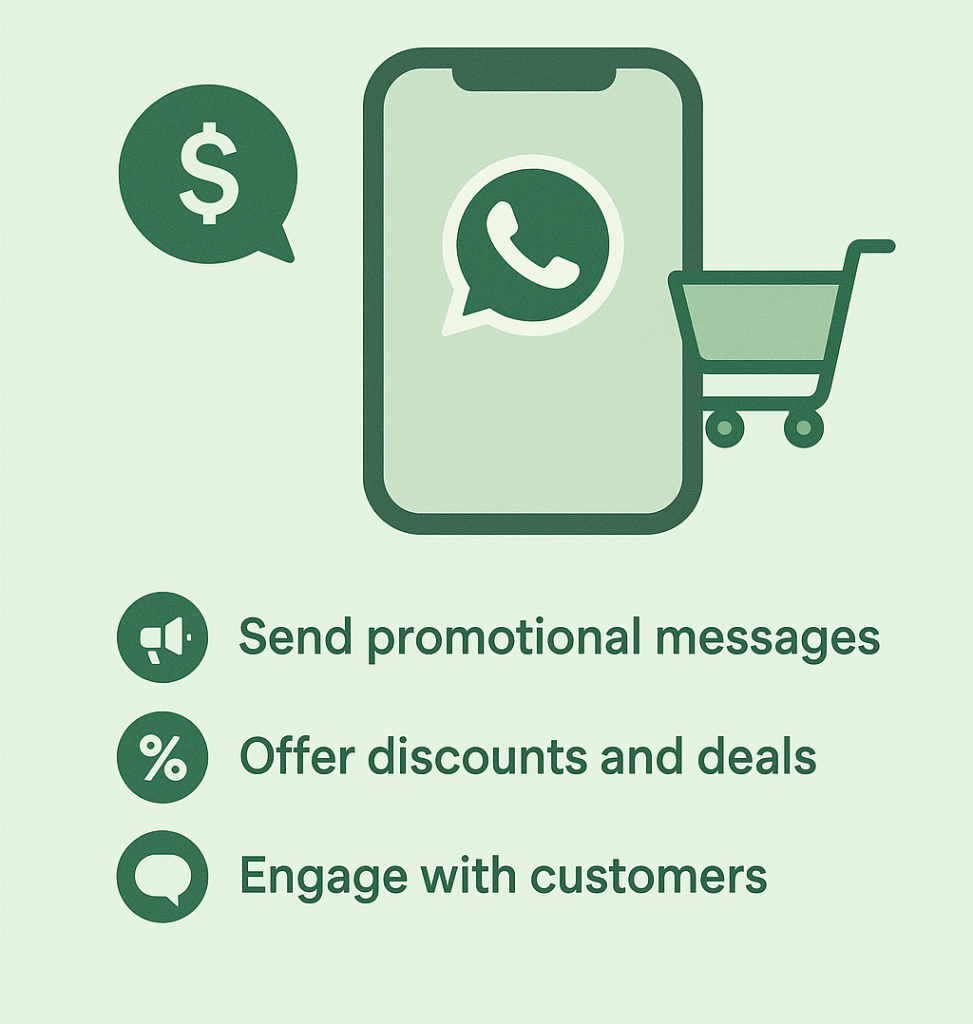
Building Customer Loyalty Through WhatsApp :
Building customer loyalty on WhatsApp involves three main activities. It starts with post-purchase engagement, sending thank-you messages and seeking feedback. Next, businesses offer loyalty rewards, such as special discounts or early access. It is directly through the platform. The overarching goal is turning one-time buyers into repeat customers. It consistently builds the relationship through personalized, high-value communication.
Turn WhatsApp Into Your Online Store’s Support Powerhouse through Botbuz :
The Botbuz platform transforms an online store’s communication into a multi-channel powerhouse. It centralizes interactions from WhatsApp, Instagram, and Facebook into one system.
How Botbuz Automates and Unifies :
End-to-End Customer Journey: It automates the entire customer journey. Right from an initial product inquiry (answering FAQs and providing catalogs) through to the final purchase (processing orders and sending real-time updates like shipping confirmations).
AI-Driven Workflows for Conversions: The Botbuz Chatbot is the core automation tool. It uses AI to personalize messages. Also it offers immediate, 24/7 support, and guides users through purchasing steps. This real-time support and guided workflow significantly enhances conversion rates.
Unifying Business Functions: It acts as a smart, single-source platform that unifies Sales (in-chat product catalog, lead qualification), Marketing (targeted broadcasts, abandoned cart reminders), and Support (instant query resolution, seamless human-agent takeover) for a cohesive customer experience.
Conclusion :
The strategic integration of WhatsApp, powered by a sophisticated solution like the Botbuz Chatbot, is no longer a luxury. It is a necessity for the modern online store. It represents the final and most critical evolution of e-commerce: conversational commerce. By operating on the world’s most used messaging app, Botbuz’s AI transcends passive web browsing and generic communication. It transforms the customer journey into a personal, seamless conversation.
This synergy delivers instant, 24/7 customer support. It provides real-time personalized product recommendations, and automated lifecycle messages. It includes abandoned cart recovery and order updates. This is all with the guaranteed high open rates of WhatsApp. Ultimately, adopting the Botbuz platform means an online store gains unparalleled operational efficiency. It builds deeper customer trust & unlocks new revenue streams by converting casual chats into reliable sales. The future of retail is conversational. The combination of WhatsApp and Botbuz provides the definitive competitive advantage.
FAQs :
- What is the difference between the WhatsApp Business App and the WhatsApp Business API for e-commerce?
The WhatsApp Business App is a free tool for small businesses. It is suitable for a single user to manage basic features like a product catalog and simple auto-replies directly on one phone. The WhatsApp Business API (or Platform), on the other hand, is paid. It is a scalable solution for medium to large enterprises. It enables full automation via chatbots, integration with CRM systems, and a shared team inbox for multiple agents. Also it provides large-scale, automated transactional messaging, which is essential for high-volume sales.
- How can an online store specifically use WhatsApp to increase sales?
Online stores can significantly increase sales. It is by using WhatsApp for personalized, timely outreach, leveraging its high open rates. Key strategies include automated abandoned cart reminders with direct checkout links. It sends exclusive promotional campaigns segmented by customer interest, providing personalized product recommendations based on purchase history. Also it runs “Click-to-WhatsApp” ads on social media to drive high-intent shoppers into a conversation for immediate conversion.
- How do I automate customer support on WhatsApp for my online store?
To automate customer support, businesses should use the WhatsApp Business API. It helps to deploy AI-powered chatbots that can provide 24/7 instant answers to repetitive queries like “Where is my order?” or “What is your return policy?” Automation should also integrate with the store’s system. It helps to send proactive, real-time order updates (confirmation, shipping, delivery) directly to the customer, minimizing the need for human agent intervention and dramatically improving customer satisfaction.
- How can I get customers to start chatting with my online store on WhatsApp?
Getting customers to initiate a chat relies on placing visible and compelling calls-to-action (CTAs) across all customer touchpoints. This includes embedding a “Click-to-Chat” button prominently on your website. Also using QR codes on product packaging and physical ads, and, most effectively, running “Click-to-WhatsApp” advertisements on platforms like Facebook and Instagram. It pre-fill a message, making it a single-tap action for the customer to begin the conversation.
- Which is a better focus for WhatsApp: marketing or customer service?
WhatsApp is most powerful when used for a hybrid approach. It integrates both marketing and customer service. They create a full conversational commerce experience. Customer service, focusing on quick issue resolution and order updates. It builds trust and loyalty, while marketing, focusing on personalized offers and product launches. Also it leverages that trust to drive conversions, making the channel a complete relationship and revenue engine.
- What key features should I set up immediately on WhatsApp Business for my online store?
The first essential features to set up are the professional Business Profile with all contact information and a website link. The visually appealing Product Catalog to allow in-app browsing, and the basic Messaging Tools. The Messaging Tools include Quick Replies for common FAQs and automated Greeting/Away Messages. It helps to ensure every customer receives an instant, professional acknowledgement, managing expectations regardless of the hour.
- What are the security and data privacy considerations for WhatsApp Business in e-commerce?
Security is maintained by WhatsApp’s platform-wide end-to-end encryption for all messages. However, e-commerce stores must take responsibility for data privacy. It ensures they get explicit customer opt-in consent before sending marketing messages. Also it uses secure API integrations with other business systems, and implements strong internal security practices like Two-Factor Authentication (2FA) and internal access controls to protect sensitive customer data.
